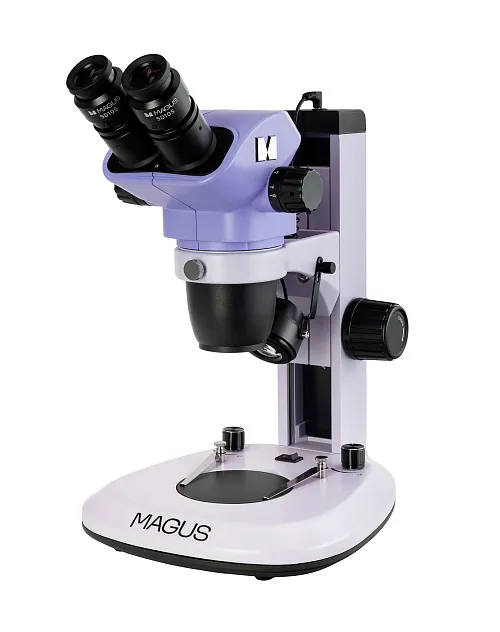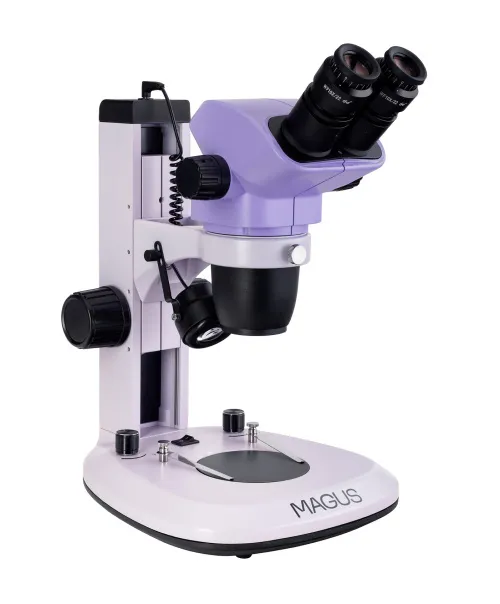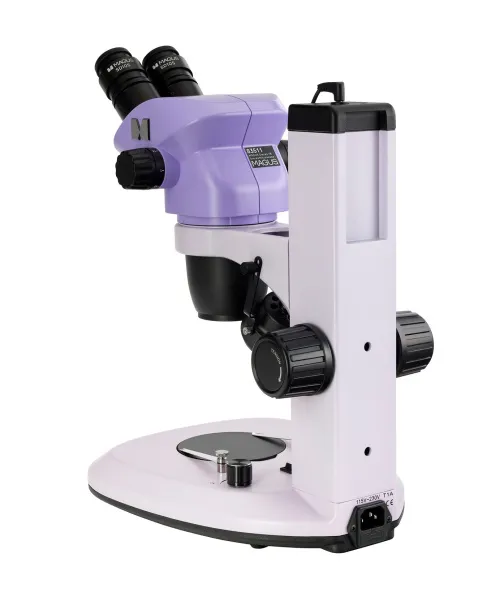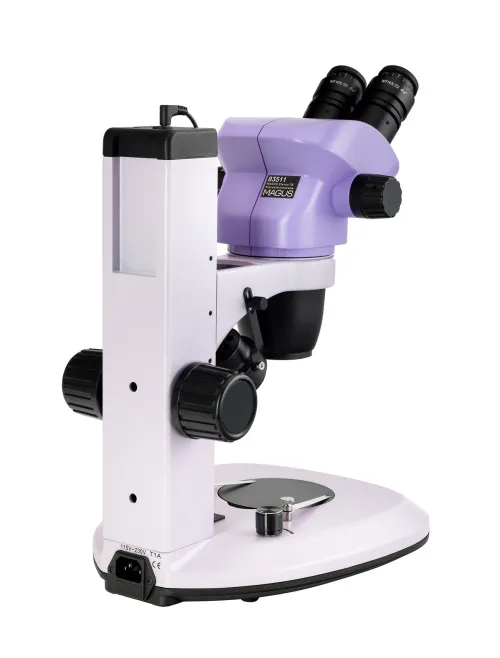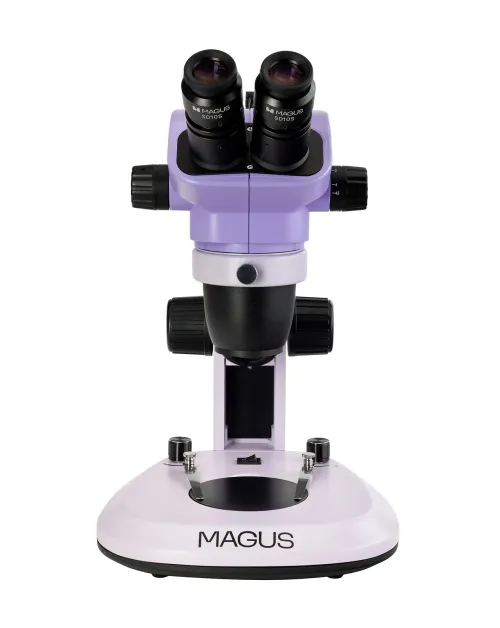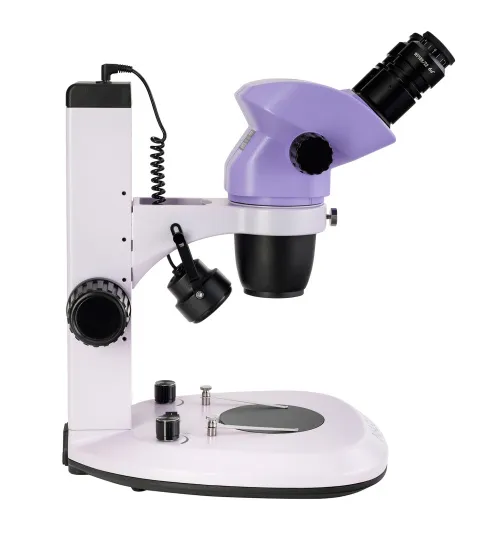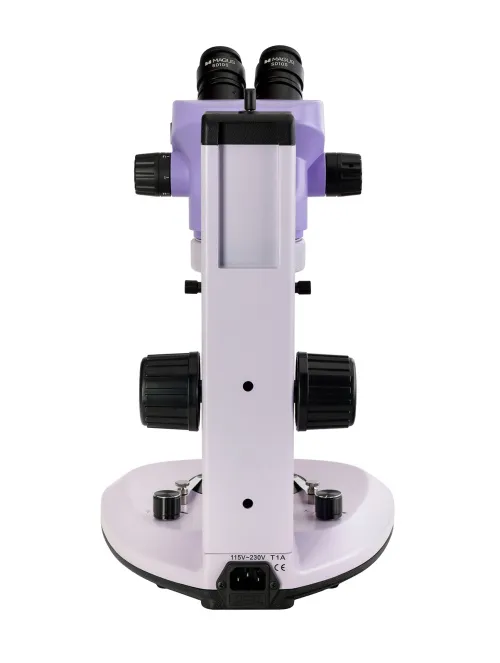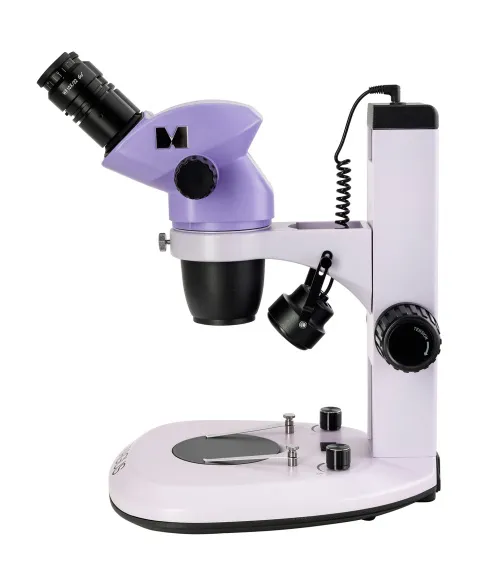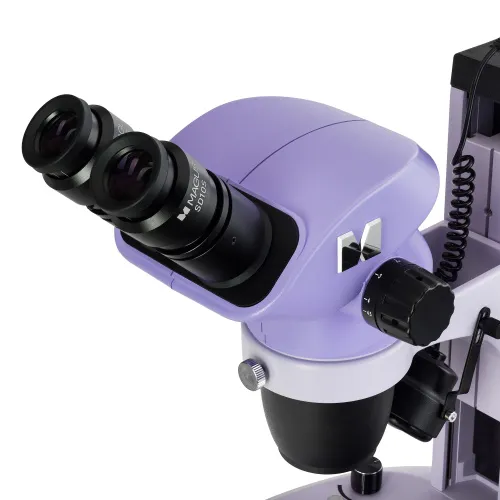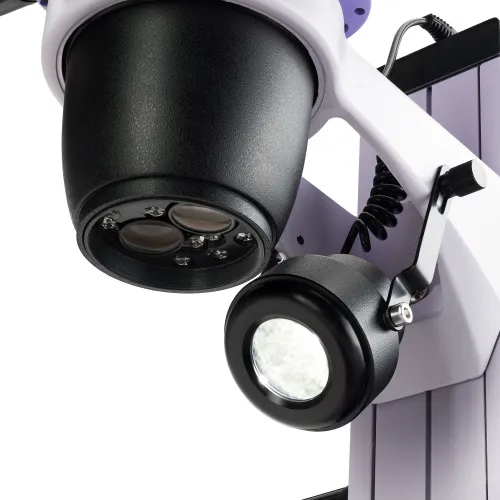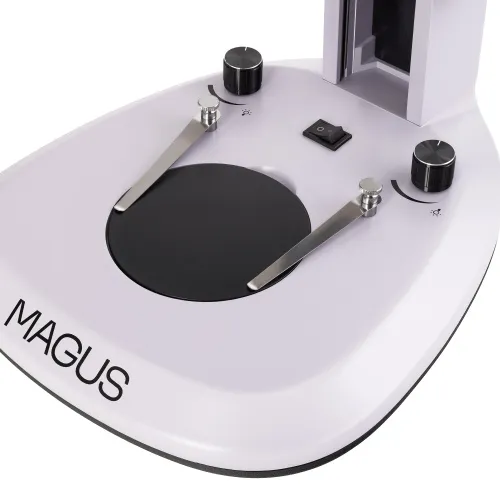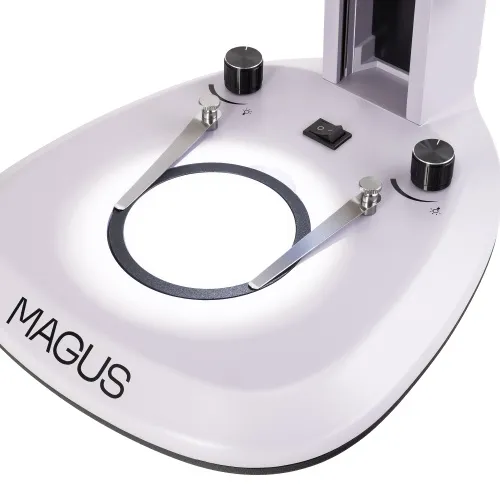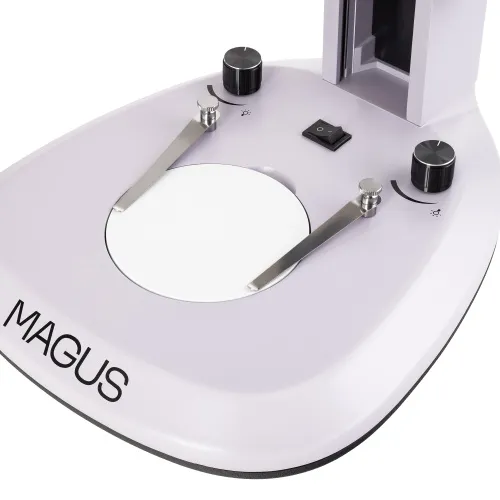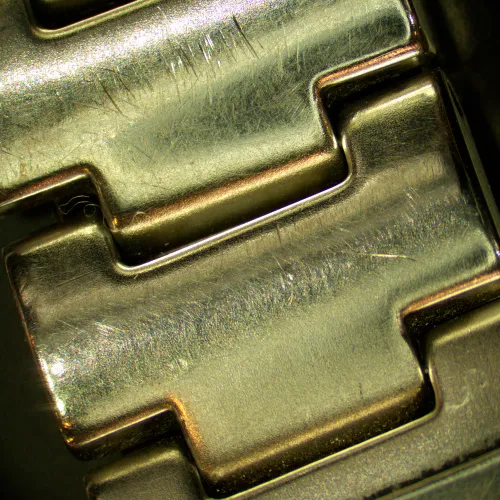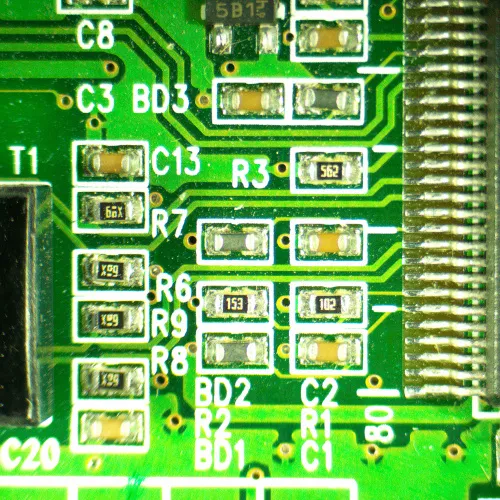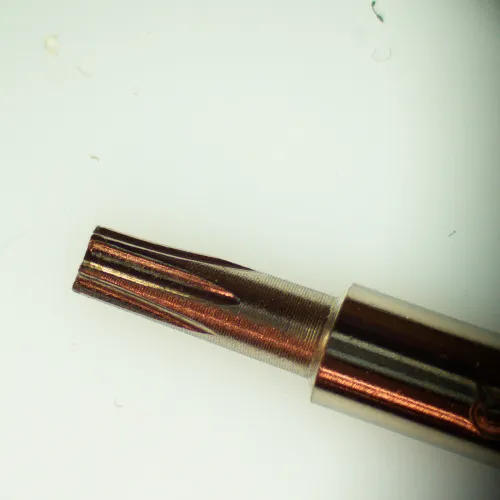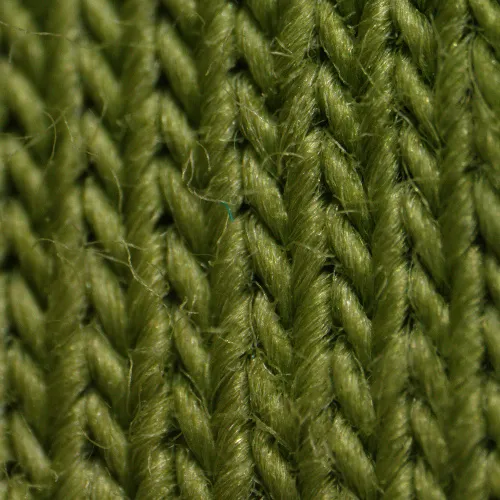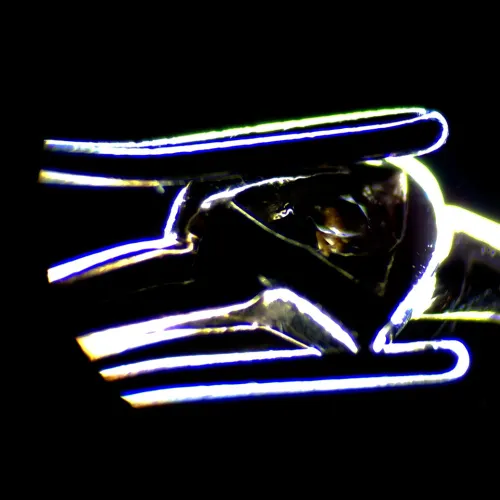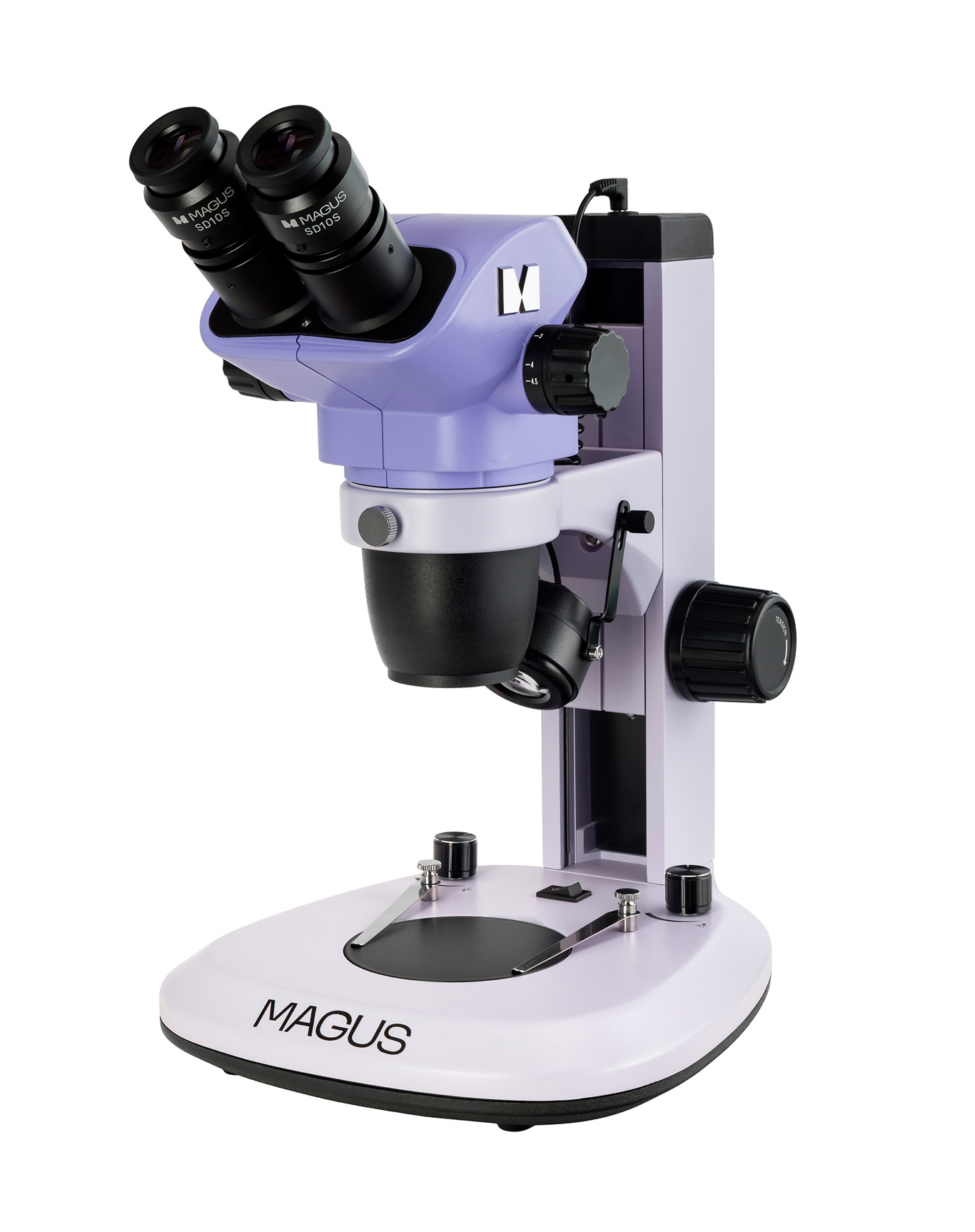MAGUS Stereo 7B Stereomicroscope
Magnification: 6.7–45x. Greenough optical design. Binocular head, 3W LED transmitted light illuminator, 3W LED reflected light oblique illuminator
| Product ID | 83511 |
| Brand | MAGUS |
| Warranty | 5 years |
| EAN | 5905555019765 |
| Package size (LxWxH) | 52x37x37 cm |
| Shipping Weight | 7.2 kg |
A stereomicroscope is an indispensable tool for the detailed study of volumetric samples. It reproduces the virtual volume of an object and allows you to examine its structure, thereby providing a clear image of its topography. The device is equipped with transmitted and reflected light illuminators and allows you to work with both transparent and opaque samples. Polarized light and darkfield methods are optionally available.
The advantages of the Greenough optical design are the large depth of field and three-dimensionality of the image due to the stereoscopic angle of 15°. A stereomicroscope magnifies an object and accurately conveys its position in space: the image is formed uninverted. This makes the microscope an ideal tool for manipulating objects within a working area of 105 to 177 millimeters. Stereomicroscopes are widely used for quality control in restoration, assembly, soldering, jewelry work, and similar processes.
The head of the MAGUS Stereo 7B microscope features 2 eyepiece tubes. If you need to connect a digital camera, it is inserted into one of the tubes. To set up comfortable and effective observation, the head can be rotated up to 360° and fixed in any intermediate position. The microscope comes with 2 eyepieces with 10x magnification and a field of view of 22mm. Diopter adjustment can be made on the eyepieces, and for those who wear glasses, the eye relief is positioned at a convenient distance.
The zoom objective changes the magnification of the subject by 6.7x without letting it out of focus. The image is formed in volumetric and upright form. You can add magnification or field of view as well as change the working distance using auxiliary objective lenses of different magnifications.
MAGUS Stereo 7B model only features coarse focusing. There are two focusing knobs that are located on both sides of the stand. The travel stiffness can be adjusted.
The stage is equipped with two different plates. The transparent one is for working in transmitted light. It scatters light, and so the object receives uniform and soft illumination. The second plate is black-and-white. It is installed on the stage according to the principle of contrast to the object of observation and is used for opaque samples.
The microscope is equipped with illuminators for transmitted and reflected light. Reflected light forms oblique lighting. Both illuminators are based on 3W LEDs with a lifespan of 50,000 hours.
The microscope is complemented by a wide variety of additional components that can be purchased separately. The range includes eyepieces and auxiliary objective lenses: They provide different magnifications, change the field of view and the working distance of the microscope. Digital cameras with broad functionality will allow you to display images on the screen or document your observations. To measure objects, you can purchase calibration slides. For studies using the darkfield method or in polarized light, the microscope can be equipped with a darkfield condenser and a polarization device, respectively. For even broader functionality of the microscope, there are a number of different illuminators: classic ring, ring with a polarizer or sector switching, and a gooseneck type. A variety of stands will allow you to choose the optimal microscope head position above the working surface and expand the working space.
Key features:
- Stereomicroscope using the Greenough optical design with a 15° stereoscopic angle
- Equipped with transmitted and reflected light illuminators and can work with transparent and opaque objects
- Supports work in polarized light and in the darkfield method
- The binocular head rotates 360° and can be fixed in any intermediate position
- The microscope produces an image with a magnification of 6.7–45x without changing its spatial orientation, which is convenient when manipulating the object
- The working area is from 105 to 177mm
- The model is equipped with a coarse focusing mechanism with two knobs
The kit includes:
- Base with built-in transmitted light source, built-in power supply, and a stand with a focusing mechanism
- Microscope head – objective with binocular head
- Eyepiece 10x/22mm with a long eye relief and diopter adjustment (2 pcs.)
- Black-and-white plate
- Transparent plate
- Reflected light oblique illuminator
- AC power cord
- Dust cover
- User manual and warranty card
Available on request:
- 10x/22mm eyepiece with scale
- 15x/16mm eyepiece (2 pcs.)
- 20x/12mm eyepiece (2 pcs.)
- 25x/9mm eyepiece (2 pcs.)
- 30x/8mm eyepiece (2 pcs.)
- Auxiliary objective lens 0.5x
- Auxiliary objective lens 1.5x
- Auxiliary objective lens 2x
- Polarization device
- Darkfield condenser
- Ring illuminator
- Ring illuminator with polarizing filter
- Ring illuminator with sector switching
- Gooseneck illuminator
- Mechanical stage
- Universal stand with a focus mount
- Gem clip
- Digital camera
- Calibration slide
| Product ID | 83511 |
| Brand | MAGUS |
| Warranty | 5 years |
| EAN | 5905555019765 |
| Package size (LxWxH) | 52x37x37 cm |
| Shipping Weight | 7.2 kg |
| Type | stereo/instrumental |
| Microscope head type | binocular |
| Head | 360 ° rotatable, lockable in any position |
| Head inclination angle | 45 ° |
| Magnification, x | 6.7 — 45 |
| Magnification, x (optional) | 3.4–270 |
| Zoom ratio | 6.7:1 |
| Eyepiece tube diameter, mm | 30 |
| Eyepieces | 10x/22 mm, long eye relief (*optional: 10x/22 mm with scale, 15x/16, 20x/12, 25x/9, 30x/8) |
| Objectives | 0.67–4.5x (*optional: when using additional eyepieces and auxiliary objectives: 3.4–270x) |
| Working distance, mm | 105 (optional: when using additional eyepieces and auxiliary objectives: 177, 47, 26) |
| Interpupillary distance, mm | 54 — 75 |
| Linear field of view, mm | 32.8 — 4.9 |
| Stage, mm | Ø95 |
| Stage features | black/white plate, transparent plate |
| Eyepiece diopter adjustment, diopters | ±5D on each eyepiece |
| Eyepiece diopter adjustment | ✓ |
| Focus | coarse (106mm, with coarse focusing tension adjustment) |
| Illumination | LED |
| Brightness adjustment | ✓ |
| Power supply | 115–230V, 50/60Hz, AC network |
| Light source type | reflected light: oblique illuminator – 3W LED; transmitted light: 3W LED |
| Operating temperature range, °C | 0...+40 |
| Ability to connect additional equipment | auxiliary objectives (0.5х, 1.5х, 2х), darkfield condenser, polarization device |
| User level | experienced users, professionals |
| Assembly and installation difficulty level | complicated |
| Optical scheme | Greenough stereomicroscope |
| Application | for applied research |
| Illumination location | dual |
| Research method | bright field |
| Pouch/case/bag in set | dust cover |
We have gathered answers to the most frequently asked questions to help you sort things out
Find out why studying eyes under a microscope is entertaining; how insects’ and arachnids’ eyes differ and what the best way is to observe such an interesting specimen
Read this review to learn how to observe human hair, what different hair looks like under a microscope and what magnification is required for observations
Learn what a numerical aperture is and how to choose a suitable objective lens for your microscope here
Learn what a spider looks like under microscope, when the best time is to take photos of it, how to study it properly at magnification and more interesting facts about observing insects and arachnids
This review for beginner explorers of the micro world introduces you to the optical, illuminating and mechanical parts of a microscope and their functions
Short article about Paramecium caudatum - a microorganism that is interesting to observe through any microscope

